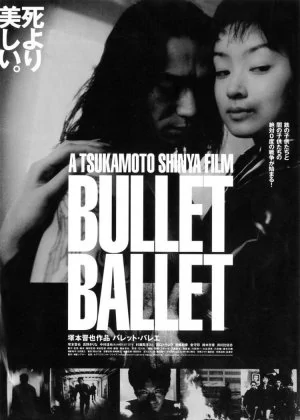Bullet Ballet
If you've been following my journey through the world of film, it probably won't come as a big surprise when I say Shinya Tsukamoto (Rokugatsu no Hebi, Soseji, Haze, Tetsuo: The Bullet Man, Akumu Tantei 2) is one of my favorite directors. His films have almost infinite rewatch value, he made only one or two duds and his vision on film is still as unique as it was when he made Tetsuo. So I eagerly sat down to watch Bullet Ballet for a second time, one of the final Tsukamoto films on my list of films that needed freshening up.

Bullet Ballet is a typical early Tsukamoto film (Tokyo Ken, Tetsuo, Tetsuo II) in almost every conceivable way, apart from the point where Tsukamoto distanced himself entirely from his favored body horror themes that characterized his first couple of films. There is still plenty of fetish and obsession to go around in Bullet Ballet, but you won't see any mutating bodies or flesh/metal biomechanics here.
Instead, underlying the manic exterior, there's a more traditional drama about a man who lost his wife to a gun accident. He becomes fascinated by these metal killing machines and ends up obsessed with owning a real gun. Even though this puts a slightly bigger focus on plot and characters, Bullet Ballet is still a film focused primarily on style, atmosphere and experience and less so on the more common emotional execution of traditional dramas.
Bullet Ballet follows the mental and social decline of a man (Goda) who lost his wife to a misfired gun he didn't even know she owned. While trying to figure out precisely how his wife came to die, he gets entangled with a group of young delinquents. At first they see him as an easy target as they try to blackmail him for all he has, but when they themselves mingle with the wrong crowds Goda jumps to their aid.

With Bullet Ballet Tsukamoto reaches back to the grim and grizzly black and white imagery of Tetsuo. The camera is extremely agile, the lighting expressive the editing manic yet razor sharp. It's vintage Tsukamoto, creating a tense, explosive visual style that slowly wears you down over time. And Tsukamoto does take his time. Where Tetsuo clocked in just under 70 minutes, Bullet Ballet goes for the full 90 minute visual assault.
But Tsukamoto's film is more than just a visual attack on the senses. Chu Ishikawa is present again to provide the film with a banging soundtrack, a nifty mix of powerful industrial tracks with softer, more ethereal sounds (obviously referencing the titular ballet). It adds a lot of extra flair and together with the visuals it creates an amazing atmosphere unique to the films of Tsukamoto.
Tsukamoto takes up the lead again and while he isn't the world's most gifted actor, he is well aware of what his films need in terms of acting performances. The problem isn't so much Tsukamoto but the rest of the cast, which clearly underperforms. Kirina Mano in particular looks ill at easy in front of the camera, unnecessarily bogging down the dramatic part of Bullet Ballet. It's a shame because it does detract a little from the overall experience.

Bullet Ballet is a film that weighs. The gritty black and white photography, the extroverted soundtrack, the fast edits coupled with a running time of almost 90 minutes and a complete lack of fantastical pressure releases make Bullet Ballet a film that is probably one of toughest in Tsukamoto's oeuvre. The grim ending probably doesn't help either, but if at that point you're still fully invested in the film I'm sure that you'll be able to cope. Fans of Sogo Ishii's early work should feel right at home though, as the punk/rock vibe is probably the biggest in this Tsukamoto film.
The second time around I was little let down by the acting performances of the secondary cast. For a film that puts more focus on drama than usually the case, that's somewhat of a problem. Luckily Tsukamoto's stylistic prowess masks this particular flaw extremely well, making sure it never dominates the film. Still, it's one of Tsukamoto's lesser films and probably not a good entry film if you're not familiar with his work. Unless of course you don't care about fantastical elements and are more susceptible to down-to-earth drama, but even then films like Kotoko or Vital might be better suited to get to know Tsukamoto's oeuvre.
